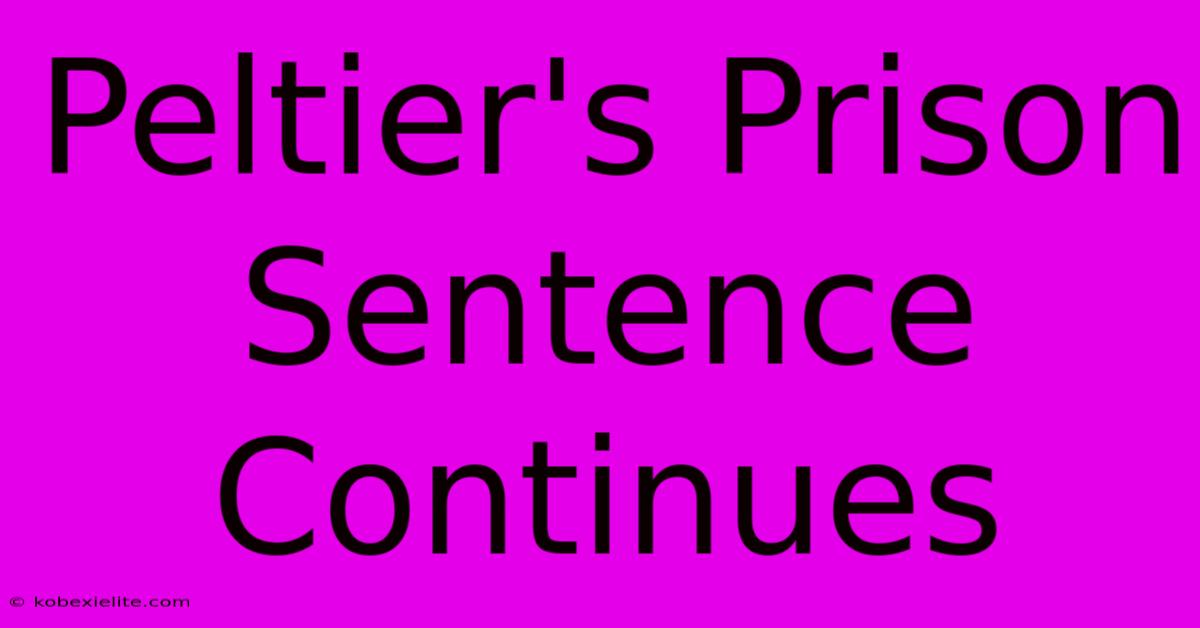Peltier's Prison Sentence Continues

Discover more detailed and exciting information on our website. Click the link below to start your adventure: Visit Best Website mr.cleine.com. Don't miss out!
Table of Contents
Peltier's Prison Sentence Continues: A Look at the Ongoing Controversy
Leonard Peltier's case remains one of the most enduring and controversial in American history. His life sentence for the deaths of two FBI agents on the Pine Ridge Reservation in 1975 continues to fuel debate, sparking ongoing activism and legal challenges. This article examines the current state of Peltier's imprisonment, the arguments surrounding his conviction, and the persistent calls for his release.
The Conviction and its Aftermath
Peltier, a member of the American Indian Movement (AIM), was convicted in 1977 of first-degree murder in the deaths of FBI agents Jack Coler and Ronald Williams. The trial, which took place in a different jurisdiction than the crime, has been heavily criticized for alleged prosecutorial misconduct, witness coercion, and the suppression of exculpatory evidence. These claims have led to decades of appeals and petitions for a new trial, maintaining the case's prominence in the ongoing conversation about Native American rights and the justice system.
Key Arguments for Peltier's Innocence
Supporters of Peltier consistently point to several key issues challenging the validity of his conviction:
- Lack of Concrete Evidence: Critics argue that the prosecution's case relied heavily on circumstantial evidence and questionable witness testimony, with a lack of definitive proof placing Peltier at the scene firing the fatal shots.
- Allegations of Witness Tampering: Concerns persist about the coercion and intimidation of witnesses, raising serious doubts about the reliability of their accounts.
- Jurisdictional Issues: Holding the trial outside of the Pine Ridge Reservation is also cited as problematic, suggesting a possible bias against Peltier and a lack of consideration for the complexities of the situation on the reservation.
- Racial and Political Motivations: Many believe that the harsh sentence reflects underlying racial biases and a politically motivated prosecution targeting AIM activists during a period of heightened tensions.
The Ongoing Fight for Justice
Despite numerous appeals, Peltier remains incarcerated. The ongoing campaign for his release involves international activism, legal challenges, and widespread public support from prominent figures and organizations. This persistent advocacy highlights the deeply entrenched concerns about the fairness of the trial and the broader context of Native American rights and justice in the United States.
International Solidarity and Calls for Clemency
Peltier's case has garnered significant international attention, with human rights organizations and individuals around the world calling for his release. Petitions, protests, and public statements consistently highlight the need for a thorough review of the case and consideration of clemency.
The Role of Media and Public Opinion
Media coverage has played a significant role in shaping public perception of Peltier's case. While some portray him as a cold-blooded killer, others highlight the alleged injustices and the need for a reassessment of the evidence. This ongoing media debate continues to shape public opinion and influence the efforts to secure his release.
Conclusion: An Unresolved Legacy
Leonard Peltier's case remains a potent symbol of the ongoing struggle for justice and equality. The unresolved questions surrounding his conviction continue to inspire activism, legal challenges, and a persistent demand for a fair and impartial review. Whether or not Peltier's sentence will ever be overturned remains uncertain, but his case serves as a stark reminder of the complexities of justice and the enduring fight for the rights of Indigenous peoples in America. The legacy of this case will continue to be debated and re-examined for years to come, prompting crucial conversations about legal reform and the pursuit of justice for all.

Thank you for visiting our website wich cover about Peltier's Prison Sentence Continues. We hope the information provided has been useful to you. Feel free to contact us if you have any questions or need further assistance. See you next time and dont miss to bookmark.
Featured Posts
-
Australian Open 2025 Paul Faces Zverev
Jan 21, 2025
-
Bears Johnson Hiring Impact And Fallout
Jan 21, 2025
-
Leonards Path Trusting His Team
Jan 21, 2025
-
Denali Gulf Renamed By Trump
Jan 21, 2025
-
Gulf Of America Possible
Jan 21, 2025
